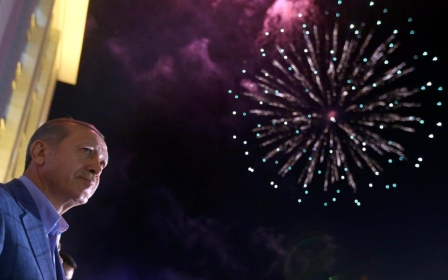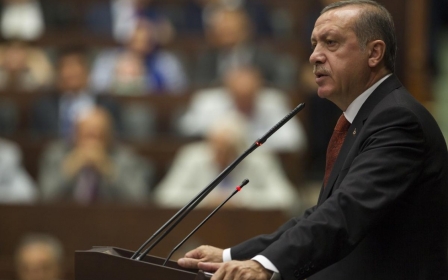Turkey’s opposition pays price for divisions

Turkey’s first direct election of the president by popular vote went as expected, with Recep Tayyip Erdogan winning the post, joint opposition candidate Ekmeleddin Ihsanoglu coming second and Kurdish party contender Selahattin Demirtas coming third.
Ihsanoglu’s showing - he won 38.44 percent of the vote - was met with disappointment by the People’s Democratic Party (CHP) and Nationalist Movement Party (MHP). However, the 9.8 percent that Demirtas achieved for the People’s Democratic Party (HDP) was hailed as progress for the Kurdish party and wider movement.
Some voters see the HDP result as a crucial breakthrough, not only for the Kurdish political agenda, but also for a section of the electorate desperately craving new perspectives in Turkish politics. However, the party remains peripheral for the general electorate, and the majority of its voters are affiliated with the outlawed Kurdistan Workers' Party (PKK).
The CHP and MHP are understandably disappointed with a showing that was worse than in municipal elections in March - when their vote reached 44 percent. This was a race that the opposition had touted as their best chance of defeating Erdogan in 12 years.
The defeat underlines that the sole chance opposition parties have in breaking the majority’s allegiance towards the AKP lies in producing competitive visions that can be ‘sold’ to the electorate. However, they face certain chronic stalemates preventing them from appealing to larger sections of society.
Unfavourable media climate
All three parties struggled to compete with Erdogan and the AKP in effectively delivering their messages within a media environment which is ranked 154th in the World Press Freedom Index.
Both Ihsanoglu and Demirtas have been complaining over reduced media coverage if compared to Erdogan. For instance, the state-run Turkish Radio and Television corporation (TRT) (Turkey’s major nation-wide media outlet) allocated much more hours to Erdogan’s activities, and his rivals did not even appear on the channel until one week before the elections.
Moreover, Erdogan entered the elections as the “prime minister”. The Organization for Security and Cooperation in Europe (OSCE) has said that: “the use of his official position, along with biased media coverage, gave him a distinct advantage over other candidates.”
The state of Turkish media not only favoured Erdogan, it also hindered the opposition parties in diversifying their electorates with its fragmented structure.
All social segments in Turkey strictly follow their own media outlets, which are all dominated by certain journalists or other opinion makers who spin the information according to the tendencies and beliefs of their target groups.
Turkish citizens followed different debates in the elections, but the opposition’s messages sometimes would not even reach the AKP electorate. Other times, it was manipulated by “spin doctors” from Erdogan’s election campaign.
Pro-government Turkish media also found it easy to target the CHP-MHP partnership’s choice of a “conservative candidate” that arguably had the potential to attract some votes from the Erdogan and his ruling Justice and Development Party (AKP).
Pro-AKP media outlets accused him of being a “stranger” to his own country and people, dragging his birth of place (Cairo) into the debate, and making much of his long residences abroad as part of his academic and diplomatic career. The newspapers said this underlined the opposition’s alienation towards Turkey’s people and showed its “elitist” vision in governing the society.
Ihsanoglu, previously an apolitical figure, was nominated by the wider opposition less than two months before the elections and urgently needed a united CHP-MHP campaign to stand a chance in the unfavourable media environment.
But perhaps fatally for his bid, the leaders of the two parties failed to make enough public appearances with Ihsanoglu. They were also unable to overcome the incompatible perspectives of the CHP and MHP electorates.
As a result, the two parties failed to generate an inspiring or collective message that could challenge Erdogan’s clear-cut rhetoric. Let alone attracting more votes, they actually appear to have lost a considerable section of support who had difficulties in understanding whose candidate Ekmeleddin Ihsanoglu actually was.
Lacking strong-minded support and an appealing discourse - his election slogan for such a critical election was “Ekmek icin Ekmeleddin (Ekmeleddin for bread)” - Ihsanoglu was only able to achieve a commendable score due to his personality.
The opposition’s limited political communications stands in contrast to a relatively successful campaign by Demirtas. This was likely because his targeted groups - socialists or radical democrats – were more politically engaged
Counting on the indivisibility of the Kurdish vote and benefiting from the ongoing ceasefire between the PKK and the Turkish army, Demirtas talked of cherishing “unity” with diversity. His youthful image, sharp wit and family-orientated lifestyle proved useful in making a first impression on potential voters.
His tailor-made messages targeted at specific groups were as effective as it could get within the current media environment.
No bridge for opposition divides
The results indicate, above all, the main position parties could not read voter behaviour.
The CHP-MHP campaign was too invested in Turkey’s polarisation, envisaging that the country’s political divisions were too solidified and they would not lose votes in a race against Erdogan, just because it was against Erdogan.
It is estimated that around 3.5 million CHP voters did not make it to the ballot and 1.5 million of MHP electorate chose Erdogan as the better candidate.
Negative long-term trends also impacted on the campaign. For instance, CHP leader Kemal Kilicdaroglu has struggled to shake the party’s elitist image.
Furthermore, choosing Ihsanoglu had a negative side-effect as the party missed the opportunity to explain an authentic vision before the upcoming legislative elections in 2015.
Since 2010, Kilicdaroglu’s boldness to reach out CHP’s non-traditional social basis increased the voting rate by 5 points to a steady 25 percent, still much lower than AKP’s consolidated votes at the 43-50 percent interval. Moreover, the party’s traditional basis composed of seculars and republicans may be deterred in case of further similar initiatives, beginning to question the appropriate representation of their own values.
For the MHP, the drawbacks of a sole “nationalistic” vision were once again manifested, with the having different meanings for diverse social groups. The party’s main election success remains sharing power as part of a coalition with Ecevit’s “democratic left” in 1999, amid a fiercely nationalistic reaction to PKK activities.
In a period of cease-fire and diminished PKK aggression, MHP is struggling to convince the majority over its political vision, and critics see little change in its political messages during the last 20 years in spite of the decisive changes in Turkey.
Demirtas was the sole opposition leader who could benefit from the country’s conjuncture and present a new vision to target groups.
This helped the HDP become a party for all Turkey in this election - although only in geographic and not social terms. For the first time, the party won votes from other regions than the Kurdish south-east - but still from voters with very distinguishable profiles.
If the HDP intends to increase its vote enough to have a larger impact on Turkish politics, it will have to tackle the following issues:
First of all, Demirtas will not likely promote his image any further. He realises that for the Kurdish movement - the main leader and rival of Erdogan is jailed PKK leader Abdullah Öcalan. Demirtas would not even want to give the impression of stealing his role and will content himself with continuing his political career as a disciple (follower) of Ocalan.
Secondly, this relative success is very delicate. The outcomes of the ongoing “peace process” between the AKP and PKK will directly affect the HDP discourse and the positive outcomes or at least the persistence of the process are key to continuing success.
Thirdly, the non-Kurdish voters for the HDP are mainly urban, well-educated sections of society. Opening up to larger masses could oblige the party to try the same type of uncertain tactics as Kilicdaroglu, and in any case, this can not even become the party’s main focus before negotiations between Öcalan and Ankara are accomplished.
- Ozan Serdaroglu has research experience on Turkey and the Eastern Mediterranean, with a focus on political and economic development, Euro-Med relations, conflict management, regional cooperation and energy issues.
The views expressed in this article belong to the author and do not necessarily reflect the editorial policy of Middle East Eye.
Photo credit: Turkey's presidential candidate and co-leader of Peoples' Democratic Party Selahattin Demirtas (AA)
Middle East Eye propose une couverture et une analyse indépendantes et incomparables du Moyen-Orient, de l’Afrique du Nord et d’autres régions du monde. Pour en savoir plus sur la reprise de ce contenu et les frais qui s’appliquent, veuillez remplir ce formulaire [en anglais]. Pour en savoir plus sur MEE, cliquez ici [en anglais].





